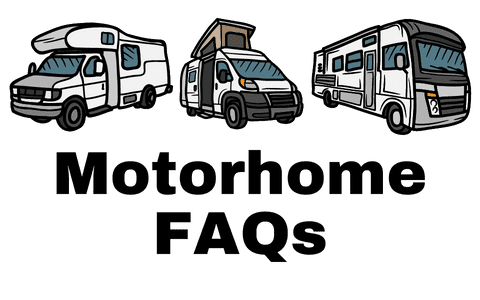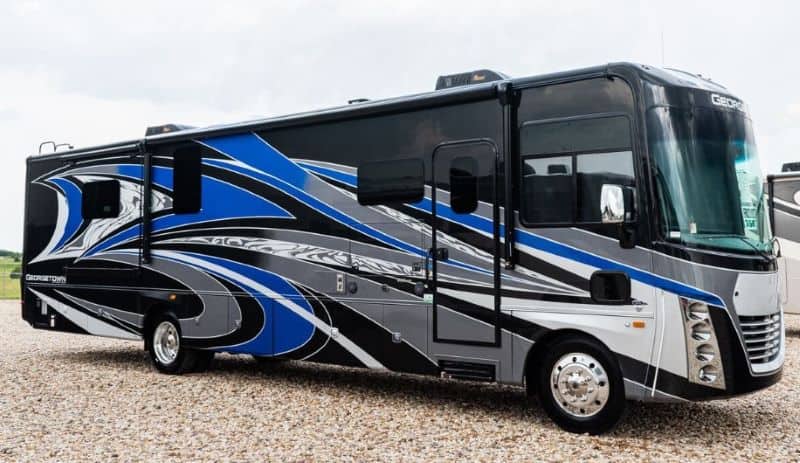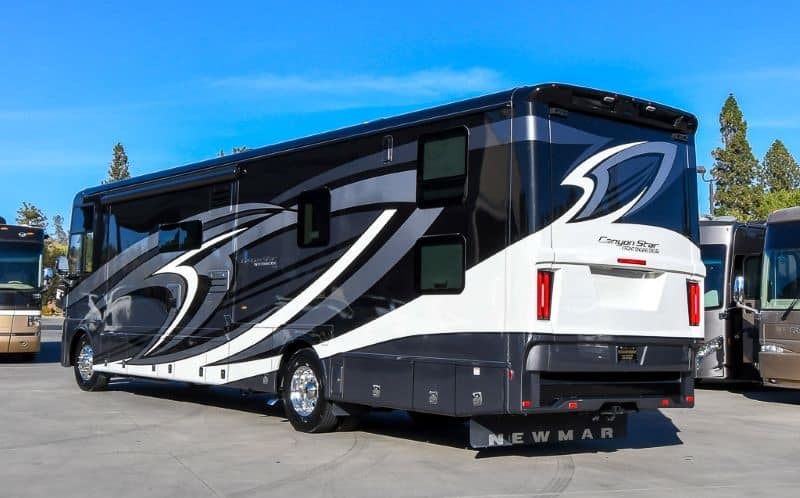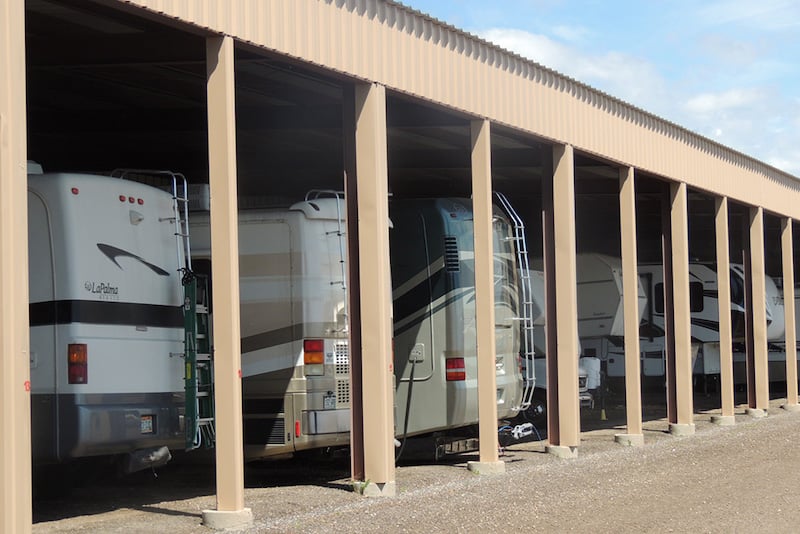For most of us, the idea of driving a massive, Class A motorhome surely requires some sort of RV license. Right? But the real answer is that it depends on the size of your rig and the state where you live.
If you have to have a Class A CDL to operate a semi-truck, it only makes sense to have one for a Class A motorhome too. Well, not exactly, though there are exceptions. One is a commercial vehicle that delivers goods from point A to point B while the other is a private, recreational vehicle, no matter how big it is.
That doesn’t mean a Class A, or even a Class C, is easy to drive, far from it. They’re long, bulky, not aerodynamically sound, and tall enough to restrict them from certain roads. This is especially true with low bridges. So, do you need a license to drive a motorhome? Mostly, it depends on the size of your motorhome and the state where you reside.
Is Driving a Motorhome Difficult?
Driving a motorhome for the first time is about the equivalent of driving your first car when you’re just a kid. It’s new and the feel of it is strange, like trying to ride a unicycle over an ant mound without smashing any ants. RV license or not, motorhomes aren’t like driving regular vehicles.
In fact, the hardest part is shedding yourself of years worth of natural habits, built up through repetition, defensive driving, and instinct. When you make a right turn, you drive forward and turn. When you make a right turn in a motorhome, you move much farther forward before beginning your turn.
If you try to turn a motorhome like a Ford Mustang, you’ll wipe out your side paneling in short order. It’s an enormous responsibility, and you’ll feel it those first few days in the driver’s seat. Fortunately, it’s just a matter of time and repetition. You’ll learn how to drive it and become more comfortable as you go.
As the saying goes, “Practice makes perfect.” There are two ways to get better. The first is the old-school method. Get the motorhome out to an abandoned parking lot somewhere and work on learning the ins and outs. The other is to take driving courses (more on that below).
When Mike from RVBlogger was learning to drive his Class A motorhome, he bought little soccer cones and practiced with them in a big parking lot. It really helped him to learn how to drive better. He also bought a course called Drive Your Motorhome Like a Pro from RV Education 101.
Since he didn’t need a license to drive his Class A motorhome, the video course provided him with lots of good info and tips that helped make him a better driver.
Do You Need a Special RV License to Drive a Motorhome?
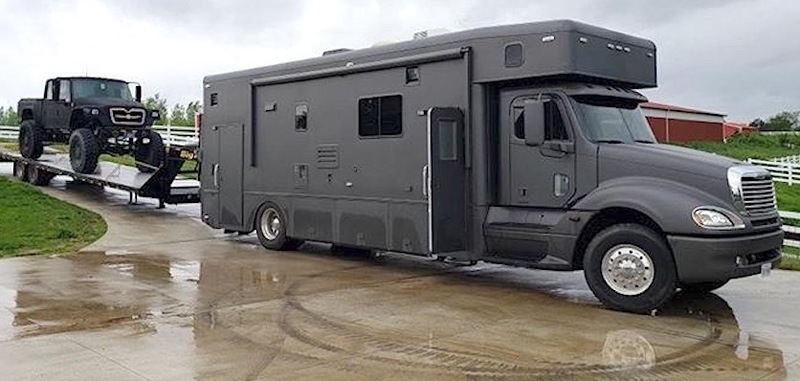
For the most part, no, you don’t need an RV license to drive a motorhome. However, there are exceptions and those exceptions are worth unpacking to keep you on the right side of the law. Whether you need an RV license depends on the size of the motorhome and the state you’re in.
Depending on specific scenarios, you may need an endorsement or a driving class rather than an actual CDL. It’s not very complicated as long as you’re aware of your specific scenario and the laws within your state. If you’re traveling to another state, you need to know the laws there as well.
In almost all circumstances, a motorhome that’s over 40′ in length or has a GVWR over 26,000 lbs will require a CDL to drive. There are motorhomes out there that are huge and break the 40′ limit or the 26,000-lb GVWR.
What you’re towing matters in some states as well, even if your motorhome is smaller. If your motorhome is well under the limits above, and you’re towing more than 10,000 lbs, some states will require a special license. The combined weight of the motorhome and the towing vehicle matters in some states, which we’ll cover more in-depth below.
Do You Need a Special RV License to Drive a Class C?
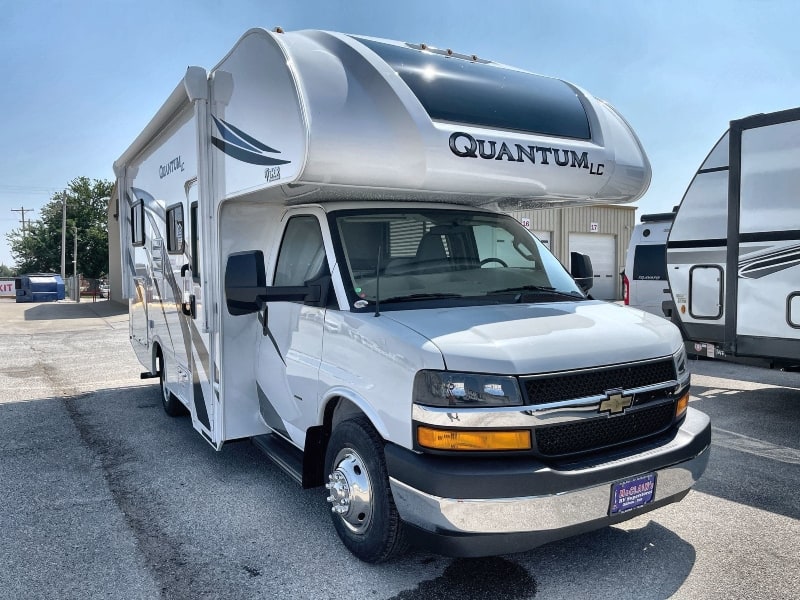
A Class C will never exceed 26,000 GVWR (unless you’re doing something crazy) or have a length that exceeds 40′. If it did, it would no longer be classified as a Class C. None of the 50 states have licensing requirements for a Class C unless a state has a combined weight law.
Some Super Class Cs are capable of towing up to 40,000 lbs. That weight combination of Super C and tow vehicle will run afoul of some state laws. A Super C with a Class 8 semi-chassis will definitely tow up to 40,000 lbs.
There are even Super Cs that exceed 26,000 lbs alone. For the most part, Class Cs have either a Class 3 or a Class 4 chassis, which is capable of towing up to 5,000 lbs. A higher-class Chassis may tow up to 20,000 lbs.
Class Cs are kind of all over the map when you include Super Cs. Plus, Class Cs, whether it’s a Super C or not, are often able to tow much more than a Class A. If the combined weight of the C and the vehicle being towed is higher than 26,000 lbs, you may run afoul of the law in some states.
Do You Need a Special RV License to Drive a Class A?
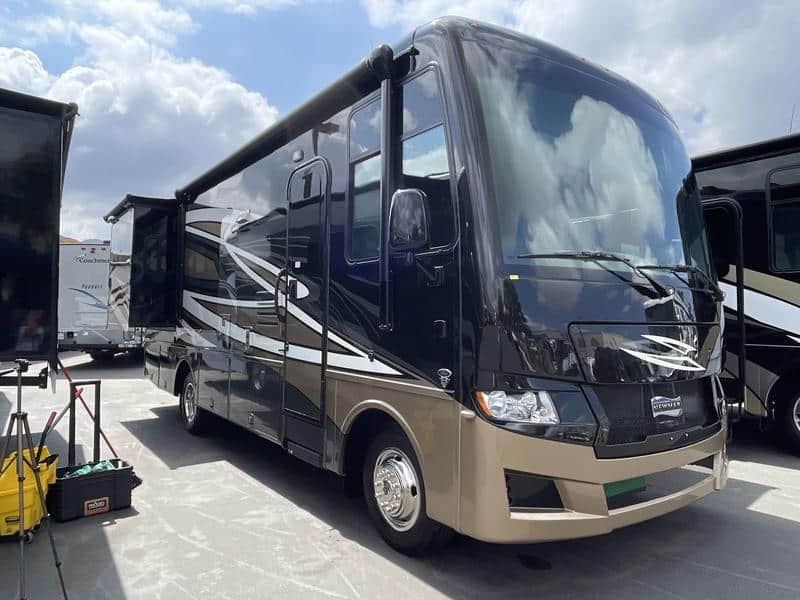
Now is the time to start listing states. A Class A motorhome that weighs more than 26,000 lbs requires an A or B commercial driver’s license in seven states, with some states requiring endorsements.
We can’t stress enough the importance of being knowledgeable of your state’s laws as well as those you may be traveling to.
| State | Weight/Length | CDL/Endorsement/Non-Commercial |
|---|---|---|
| Alabama | ||
| Alaska | ||
| Arizona | ||
| Arkansas | Exceeds 26,000 lbs | Requires CDL |
| California | Towing more than 10,000 lbs Vehicle exceeds 26,000 lbs or is longer than 40′ | Requires CDL Non-commercial DL or Endorsement |
| Colorado | None | None |
| Connecticut | Single or combined over 26,000 lbs | Requires CDL |
| Delaware | ||
| Florida | ||
| Georgia | ||
| Hawaii | Single or combined over 26,000 lbs | Requires CDL |
| Idaho | ||
| Illinois | ||
| Indiana | ||
| Iowa | ||
| Kansas | Single or combined over 26,000 lbs | Requires CDL |
| Kentucky | ||
| Louisiana | ||
| Maine | ||
| Maryland | Exceeds 26,000 lbs | Non-Commercial DL or Endorsement |
| Massachusetts | None | None |
| Michigan | Exceeds 26,000 lbs | Requires CDL |
| Minnesota | ||
| Mississippi | ||
| Missouri | ||
| Montana | ||
| Nebraska | ||
| Nevada | Combined weight exceeds 26,000 lbs Single vehicle exceeds 26,000 lbs Towing over 10,000 lbs with combined weight lower than 26,000 lbs | Class A CDL Class B CDL “J” Endorsement |
| New Hampshire | ||
| New Jersey | ||
| New Mexico | Single or combined over 26,000 lbs | Requires CDL |
| New York | Exceeds 26,000 lbs | Vehicle R Endorsement |
| North Carolina | Combined weight exceeds 26,000 lbs Single Vehicle Exceeds 26,000 lbs | Requires CDL Non-Commercial DL or Endorsement |
| North Dakota | ||
| Ohio | ||
| Oklahoma | ||
| Oregon | ||
| Pennsylvania | Exceeds 26,000 lbs | Class B |
| Rhode Island | None | None |
| South Carolina | Single or Combined over 26,000 lbs | Requires CDL |
| South Dakota | ||
| Tennessee | ||
| Texas | Towing over 10,000 or Single Weight Exceeds 26,000 lbs Exceeds 26,000 lbs and towing over 10,000 lbs | Class B CDL Class A CDL |
| Utah | ||
| Vermont | ||
| Virginia | ||
| Washington | ||
| West Virginia | ||
| Wisconsin | Vehicle exceeds 45′ | Requires CDL |
| Wyoming | Exceeds 26,000 lbs and towing over 10,000 lbs Exceeds 26,000 lbs and towing less than 10,000 lbs | Class A CDL Class B CDL |
Are There Driving Courses That Will Get You an RV License?
Not only are there CDL driving courses in every state, but there are also RV driving courses as well. If the weight of your motorhome or the combination of your motorhome and the vehicle you’re towing exceeds your state’s limitations, you will have to acquire a CDL.
At the very least, you may need to acquire a specific endorsement on your driver’s license or a non-commercial DL. Since CDLs (Commercial Driver’s License) were originally created for those transporting goods and operating as a business, it may be confusing to those who just want to drive a monster motorhome.
However, as the saying goes, “That’s the way the cookie crumbles.” On the bright side, if you have to go to a class to get your CDL for a Class A or Super C, you’ll also become qualified to drive whatever vehicles fall under the Class of license you receive.
Feel free to contact your local DMV and have your specs ready to go. Tell them what you have, and they will let you know what you need to do next. If you don’t need a CDL, that’s perfectly fine.
However, if you’re a little nervous about driving a motorhome, check around for local RV driving courses. You won’t get an RV license for taking it, but you’ll learn a lot.
Is a Class A Harder to Drive Than a Class C?
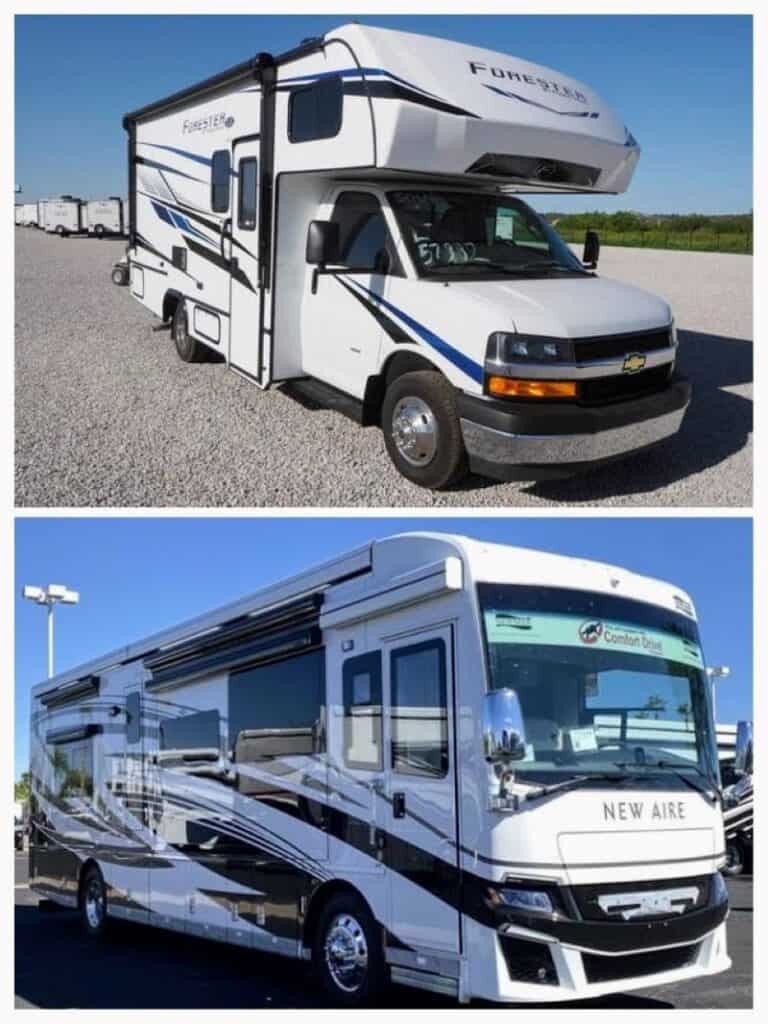
A Class A is not necessarily harder to drive than a Class C so much as it’s different. Driving a Class A versus a Class C doesn’t feel the same. That includes Super Cs. You’re dealing with different chassis, engines, seating positions, lengths, widths, torque, acceleration, and weights.
Class As are often much longer, wider, and taller than Class Cs. If you’re used to driving a Class C, driving a Class A will require a little more care when turning corners and driving through areas with low-hanging infrastructure.
Should I Buy a Smaller Motorhome First?
That’s one way of doing it. RVers who are comfortable driving Class Cs are more prone to upgrading to Super Cs and Class As. It’s like a natural progression from one to the next. If you’re eyeballing a motorhome, and it’s your first, a Class C may be the better fit if driving a Class A makes you a bit nervous.
Later on down the road, if you’re ready to upgrade, the change won’t be as severe. However, you will have to get used to the differences in the driver seat, the nose shape of a Class A versus a Class C, and the additional length.
Another worthwhile option is going for an RV rental. This will give you an idea on what makes you comfortable without needing to break the bank on a motorhome you hate driving. Take it for a spin over the weekend and see what you think. It’s as good a learning tool as you’ll find without spending a ton of money.
Is Motorhome Insurance Expensive?
It can be, but not always, if that makes sense. That’s because it’s just like homes and vehicles, with a ton of intangibles and circumstances to consider. One person’s RV insurance might be radically different from another’s, in terms of cost.
There’s personal history, RV history, RV type, age, miles driven, amount of coverage, the state you live in, and on and on it goes. Isn’t insurance lovely? Do you want roadside assistance? Is the motorhome still under warranty? Did you serve in the military? What coverages do you want?
Most coverages fit within some type of plan, so it’s a matter of sitting down and pouring over the paperwork. One of the best RV insurance companies out there is Roamly, simply because the company was founded and operated by RVers.
If you’re looking into motorhome insurance rates for the first time, you would do well to check them out first and see what your options are.
Final Thoughts on RV-Specific Licenses
For the vast majority of motorhomes out there, you probably won’t need an RV license of some sort to operate one. As you can see from our expansive state-table above, a lot depends on what state you live in, what motorhome you have, and what you’re towing behind you.
The state you live in is the dominating force in terms of the laws you have to adhere to in your motorhome. However, when you’re traveling the country, it pays to check ahead. You don’t want to be the last to know while you’re sitting on the side of the road with a state trooper writing out a ticket.
If you’re in a massive motorhome, Super C, or plan on towing something heavy, check ahead and pay attention to your own state laws (laws change after all). As long as you’re in the know, you’ll always have your bases covered.
Related Reading:
1. How Much Can a Class A Motorhome Tow?
2. How Much Can a Class C RV Tow?
3. Are Motorhome Prices Dropping?
4. What Is A Diesel Pusher?
About the Author:
Thomas Godwin is a full-time freelance writer with a BFA in Creative Writing, a U.S. Marine, and an avid outdoorsman.
When he’s not writing, he’s raising chickens and Appleyard ducks. Thomas also constructs teardrop campers (attempting to anyway) and kayaks the Blackwater River with his wife, two daughters, and his Dobermans.

